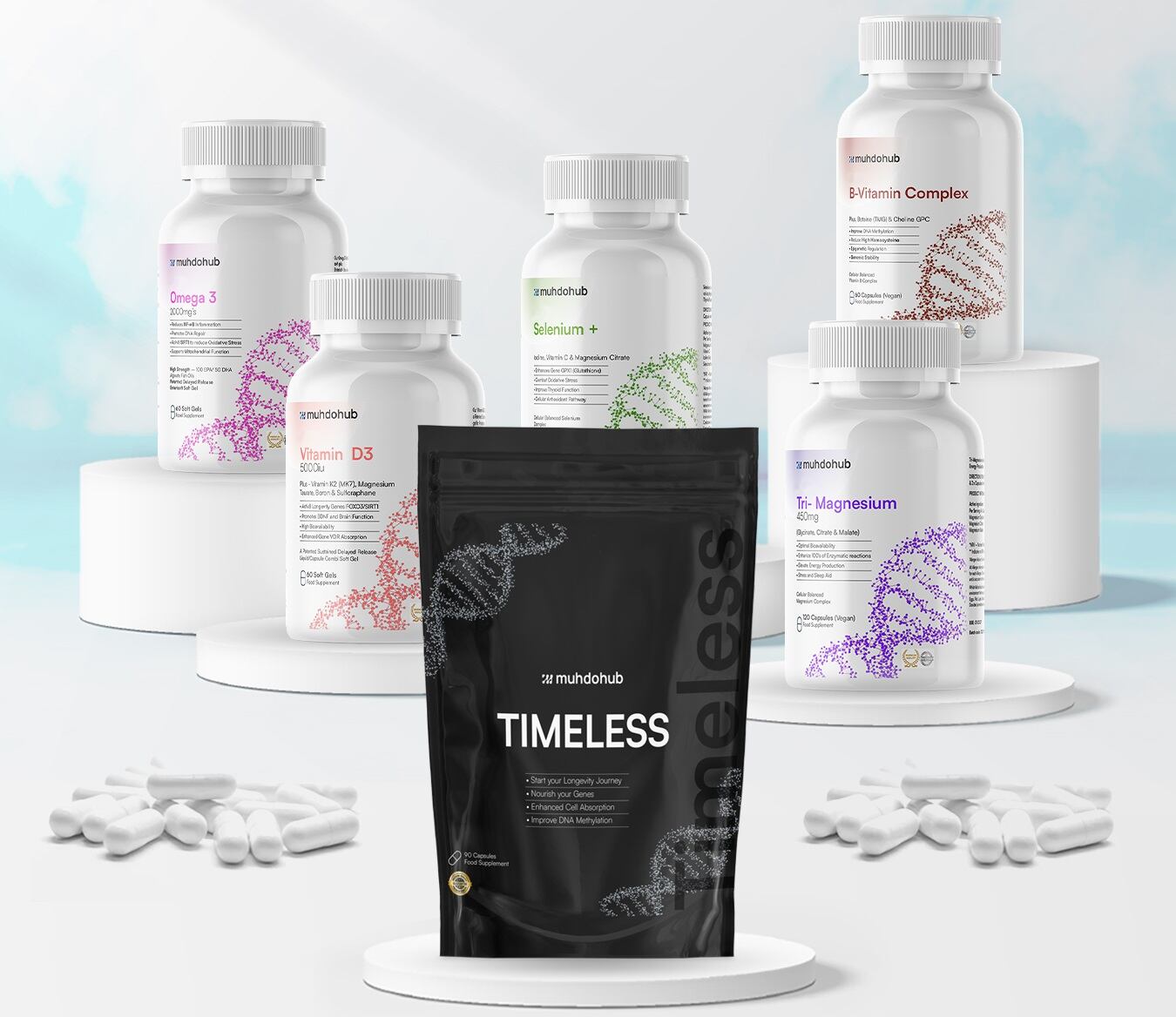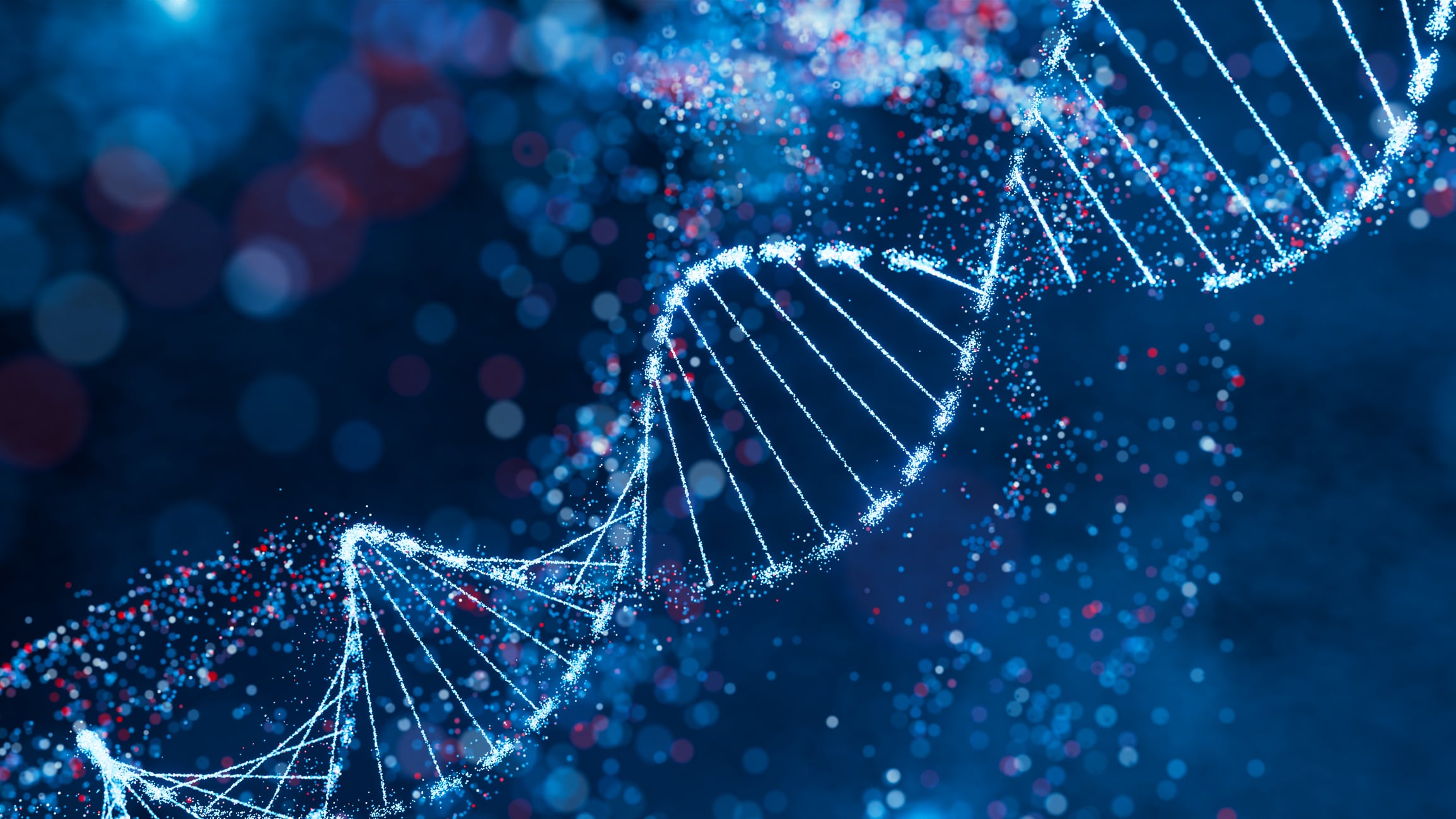James Brown, a sports and performance nutritionist, founded Muhdo in 2017 to provide personalized nutrition and lifestyle advice based on epigenetic research.
After receiving thousands of saliva and blood work readings from around the world, he and his team spent eight years using AI to identify the most common deficiencies and inefficiencies, streamlining processing and interpretation to create a new range of longevity supplements.
Reversing the biological clock
As a nutritionist who has created supplement formulations for elite sports teams—including Team GB and the England World Cup squad—Brown is well-versed in sports nutrition. He also has a background in epigenetics, having now deciphered a wide range of nutrients that may help to slow down—or even reverse— biological aging.
“We look at thousands of genes and tens of thousands of genetic SNPs [single nucleotide polymorphisms], then layered on top of that 950,000 CpG sites, which are a specific region on your DNA involved in epigenetic regulation and where the magic happens, so to speak,” he told NutraIngredients. “These areas are influenced by your day-to-day life and environment and inform whether a gene or group of genes is stimulated and turned on or off.
“From this research, we’ve seen various compounds and nutrients that have a direct effect on slowing aging, and there are certain pathways that we’ve tried to tackle as best we can.”
The result is a range of six supplements: a longevity formulation called Timeless, as well as individual vitamin D, magnesium, vitamin B, omega-3 and selenium supplements. Each is specifically designed to target the hallmarks of aging.
“We decided to focus on supplements that most people will probably need to take, regardless of whether they’ve got genetic requirements or certain predispositions for not processing it,” he explained.
Brown says this sets Muhdo apart from its competitors who seem inclined to follow trending yet under-researched compounds, such as NMN (nicotinamide mononucleotide) and NAD (nicotinamide adenine dinucleotide) precursors.
How does Muhdohub differ from other anti-aging solutions?
Timeless is composed of 45 nutrients, including 13 vitamins, 12 minerals and 20 ‘special’ ingredients.
The “multivitamin on steroids” specifically targets methylation and glutathione production necessary for intercellular communication—the various signaling processes that occur within a single cell to regulate its functions, responses and overall homeostasis.
In addition to the all-in-one, anti-aging solution, the brand’s individual vitamin range is aimed at consumers looking to target specific needs.
At the top of the list is vitamin D, which Brown says is key to the anti-aging process.
“Vitamin D regulates around a thousand genes or about one 24th of the genome, so, calling it ‘vitamin D’ doesn’t really do it justice,” he said. “We need to look at it in the same way as we look at water or breathing or food. If we don’t get enough vitamin D, it can dramatically affect our lifestyle.”
According to Brown, many vitamin D formulations are not designed for optimal absorption. Muhdo’s supplement attempts to buck this trend, with a formula including K2, magnesium, boron and sulforaphane, which upregulate the vitamin and “tickle the expression” of certain longevity genes.

Selenium, which Brown describes as “the superman of antioxidants”, is a key nutrient involved in the regulation of the GPX genes and glutathione production.
“Around 60% to 70% of people have an issue processing selenium,” he said. “Added to this, most people don’t get enough selenium in their diets due to modern day farming practices.”
The formula has therefore been developed for optimal absorption, consisting of selenium, as well as vitamin C, iodine and magnesium. Vitamin C enhances selenium absorption by increasing its bioavailability, iodine optimizes selenium utilization for thyroid function, and magnesium supports its cellular transport and activation.
“They’re like the Health Avengers," he said. “You need them all together to get the most out of that specific nutrient.”
Omega-3 was chosen for its anti-inflammatory properties, with Muhdo’s supplement comprised of EPA (eicosapentaenoic acid) and DHA (docosahexaenoic acid): two fatty acids Muhdo has seen the most benefit from in its research.
“The capsule is a unique, patented capsule that is time-released, preventing the fishy aftertaste many other supplements have,” Brown said.
The magnesium supplement, which is used to aid sleep, consists of a blend of three types of the mineral: glycinate which promotes relaxation, malate which helps to detox heavy metals and citrate for gut health.
Finally, Muhdo has released a novel B vitamin complex, comprised of a host of specially chosen ingredients.
“Cyanocobalamin is the type of B vitamin that most supplement companies use, but it’s synthetic, so it isn’t efficiently processed, and the benefits are therefore less apparent.”
Muhdo’s supplement contains adenosylcobalamin, one of the two active coenzyme forms of vitamin B12, which supports mitochondria, and hydroxocobalamin to support DNA methylation and improve energy production.
Betaine trimethylglycine and Alpha-GPC (L-alpha-glycerylphosphorylcholine) were also added to the formula to slow down the build-up of homocysteine and improve mental clarity and cognitive function.
A transparent approach
Creating the supplement range has been a tumultuous journey, Brown noted, as he feared customers would be wary of buying supplements from a company that has told them which vitamins or minerals they are deficient in.
However, he grew tired of directing his customers to other brands, especially when he was concerned that some supplement brands lack transparency about the exact amounts of individual ingredients.
“A lot of companies hide behind proprietary blends, or they say there’s 200 mg of magnesium, then you get it tested, and there’s actually only 50 mg,” he said. “It’s a bit like the Wild West, the supplement industry. It’s not regulated how it should be, unfortunately.”
Muhdo therefore formulated with transparency in mind, and plans to launch QR codes on the full supplement range. These QR codes will provide consumers with information including ingredient origins, certificates of analysis, manufacturing dates, batch numbers, ingredient functions, the genes and pathways they activate, and their health benefits.
“The main thing for us is getting people to understand what the supplement is doing in the body, what the ingredients are and where they’re sourced from,” he said.
The future of epigenetics
Looking ahead, Brown said Muhdo plans to release a variety of targeted supplement collections, as well as an “all over body solution” in the coming months.
Furthermore, it is Brown’s hope that advances in science will allow people to track how daily nutrient consumption will influence their epigenome.
“In the not-so-distant future, we will be able to see how the specific nutrients that you ingest each day are having an effect on your epigenome, thus affecting your gene expression and the possible health pathway you are heading down,” he said.
This, he noted, will essentially “gamify genetics” and provide granular detail about what is going on at a cellular level.
And with the aim of empowering customers to “control and monetize their health data,” the brand launched a crypto currency, $DNA, on Dec. 23.
As Brown explained, the purpose is to offer an alternative to some current healthcare systems that may sell consumer data to big pharma without consent.
The crypto launch is part of a bigger move towards developing a strong online community, self-named the “Muhdtonians”.





